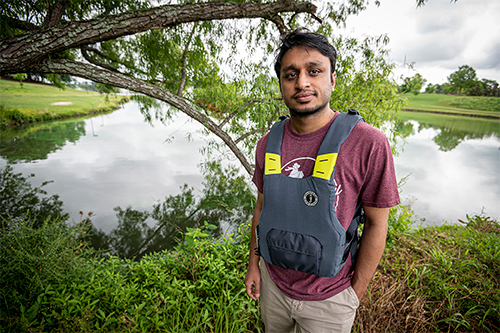Life vest research at MSU changing course for commercial fishermen

Amit Talukder poses in a life jacket prototype. PHOTO: David Ammon | Agriculture and Natural Resources Marketing
While many Mississippians may be surprised to know the commercial fishing industry has an almost $100 million economic impact in the Magnolia State, they may be even more startled to know that, nationwide, the lucrative but dangerous business accounts for approximately 43 deaths per year.
Mississippi State University experts are delving into one of the leading causes of these commercial fishing workplace fatalities -- falling overboard -- and developing life jackets with scientifically engineered materials and technology.
“Most commercial fishermen understand the risks of falling overboard, but choose to not wear life jackets for many reasons,” said Charles Freeman, associate professor of fashion design and merchandising in MSU’s School of Human Sciences. “We want to change these perceptions by making the jackets more accessible to wearers.”
Freeman and other MSU researchers with the Mississippi Agricultural and Forestry Experiment Station, or MAFES, and the university’s Athlete Engineering Program are partnering with Mississippi Commercial Fisheries United on improvements to the personal flotation devices.
With funding from the National Institute for Occupational Safety and Health, the team has conducted interviews with fishermen and discovered most believe regular life vests are bulky, uncomfortable and hinder their mobility while working. The team has taken this information and performed tests while fishermen are wearing them, examining breathability through pulmonary function tests and monitoring heart rate and postural stability.
Scientists involved in the research are designing and developing an alternative, identifying mobility and postural issues by examining fibers used and modifying these with scientifically engineered, advanced fabrics and electronics.
“The re-design of the jackets not only has to take in to account the buoyancy and safety measures, but also must meet the physical demands for movement and postural support while on the vessels. This has been one of the major challenges for this project,” Freeman said.
Amit Talukder, a graduate research assistant in the School of Human Sciences, shared some of the technologies his research is utilizing.
“We are implementing photovoltaic cells, or solar cells, within the lining of the jacket. These cells convert light into energy and would allow the fishermen to charge their smart devices in times of need,” Talukder said. “We are also investigating adding Bluetooth tracking within the jackets to help locate fishermen if they go overboard.”
While the project is still underway, Talukder said the ultimate goal is to reduce the number of fatalities.
“We are trying to make work safer for commercial fishermen along the coast. So, if we are able to make a better life jacket that is safer and more comfortable for its wearers, we will be able to make a substantial change in the industry,” Talukder said.
For more information about MAFES, visit www.mafes.msstate.edu.
To learn more about MSU’s Athlete Engineering research team, visit www.cavs.msstate.edu/research/athlete_engineering.php.
Mississippi State University is taking care of what matters. Learn more at www.msstate.edu.
Trey Barrett | Agriculture and Natural Resources Marketing



